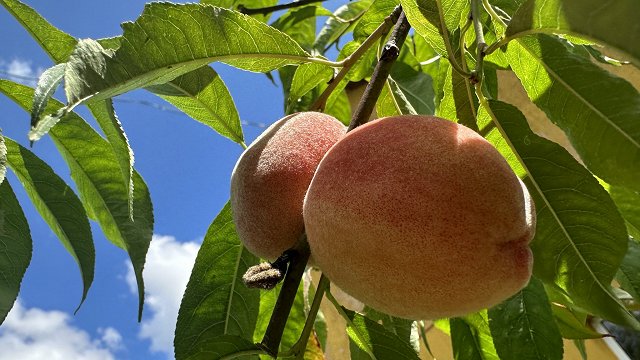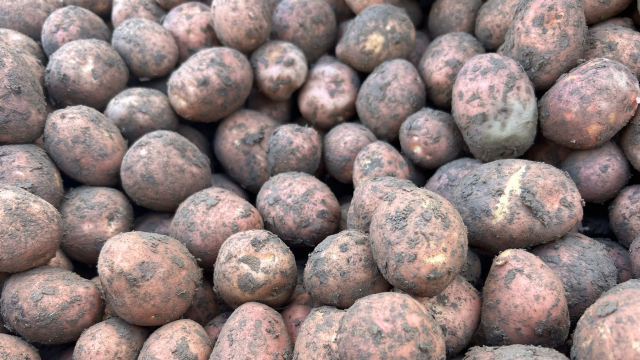To provide reliable and representative data on the entire nation's menu, AP selected, what it deemed a single representative traditional Latvian family – grandmother, mother, granddaughter – and sent them shopping for a week on a budget of 200 euros, then analyzed some of the items chosen.
The issue tackled by the show is topical in Latvian society, as unhealthy eating habits can have a direct impact on the health and life of people, and it is clear that Latvians are not doing so well in those regards.
As reported earlier in another feature by LSM, in 2021, life expectancy in the EU was 80.1 years, while Latvia ranked closer to the bottom of the EU with 73.1 years. However, in 2022 there was an increase – the average life expectancy of the EU was 80.7 years, according to preliminary data from Eurostat. Meanwhile, data compiled by the Central Statistical Bureau (CSB) show that in Latvia in 2022 the average life expectancy at birth was 74.4 years. In both the Eurostat data and the OECD study, Latvia ranks near the bottom.
Another indicator to look at is healthy life expectancy or healthy life years. In this respect, the picture in Latvia is bleak. Latvia has had the shortest healthy life expectancy in the EU since 2013. The latest European data for 2021 show that Latvians have a healthy life of 53.8 years. Since 2013, Latvian men also have had the shortest healthy life expectancy in the EU – 52.2 years in 2021. Regarding women, Latvia was in the penultimate place in the EU in 2021 with 55.4 years of healthy life.
Latvia's leading cause of death is cardiovascular disease, according to the Disease Prevention and Control Center (SPKC), which in many cases can be lifestyle-related. The 'Forbidden Method' also referred to a study from the Disease Prevention and Control Center (SPKC) on Latvia's overall health habits, among those high levels of alcohol consumption, not enough physical exercise, and the topic of the research – eating habits.
With the help of experts – cardiologist Andris Skride, dietologist Andis Brēmanis, and BIOR nutritionist Inese Siksna – the 'Forbidden Method' team created a list of nutrients Latvians tend to eat too much or too little of, and backed up their claims by showing off separate items bought by the family involved.
Salt
Too much salt is linked to high blood pressure over the years and can cause cardiovascular disease. The average person needs less than 5 grams of salt per day, as recommended by the World Health Organization. According to BIOR's expert Inese Siksna, Latvian women eat on average 8 grams of salt per day, while men – 12 grams per day.
To illustrate this, AP looked in the shopping cart of 73-year-old grandmother Biruta, her 37-year-old daughter Ilze, and seven-year-old granddaughter Maija, paying special attention to processed meats and instant noodles. For example, a pack of 'Kabanos' snack sausages, with a salt content of 2.10 grams per 100 g. LTV asked who eats those.
"Maija, it's one of her favorite snacks, she takes a couple to school in her lunch box or eats some when she comes home. But it's not like she finishes a pack in one sitting," says Ilze. Instant noodles, according to Ilze, are also a snack for Maija. Grandmother Biruta backs this up saying that she uses salt in her cooking very little, but the child often sprinkles salt over her pasta. Maija herself confirms the accusation, adding she doesn't sprinkle much.
Sugar
WHO's guidelines suggest that under 25 grams of free sugars per day would be ideal. There is no exact data on sugar consumption in Latvia, but there is data on obesity, which is one of the side effects having too much sugar can cause. According to SPKC data, excess weight and obesity at a young age is more common among males, but later in life among females. The graph below illustrates the percentage of people with excess weight in age categories over the years.
The family, when asked about their sugar habits, states the following.
Biruta: "My daughter doesn't use sugar in coffee, I add a table-no, not a tablespoon, a teaspoon. Snacks? An orange, no, a tangerine, or... you know, apples. What else? I like cookies from Lidl, butter cookies with a chocolate glaze. I sometimes buy those."
Asked about the pack of sugar in their weekly shopping cart, Ilze says it is for "weekend pancakes and grandmother's coffee". Another item catching LTV's eye is Nesquik cereal, with 22.4 grams of sugar per 100 g. That, according to Ilze, goes to Maija, but "she eats 3–4 tablespoons at a time." A chocolate bar with 50 grams of sugar per 100 g is also pinned on the youngest: "She takes it to school and shares it with others, she doesn't eat it all by herself."
Fat
"The recommended fat content in total energy consumption should be 30%. We eat around 40%," said BIOR's Inese Siksna, drawing special attention to saturated fats, found in animal products like dairy, especially butter and heavy cream.
The family also has a pack of butter in their shopping cart – for omelets and to spread on bread, according to Ilze. LTV is more interested in other products bought, such as a croissant, with 30 grams of fat and 15 grams of saturated fats per 100 grams.
"It would be nice if such products had a warning sign, that it's a [..] deadly combination. Like there is a green spoon label, these should have a label Do not eat or Think before you eat," Ilze said.
Animal and plant protein
The 'Forbidden Method' opens this section of their show by referring to Nordic Nutrition Recommendations 2023, which Latvia also uses among its guidelines. LTV's broadcast cites the paper by saying that "we should eat meat less and replace that protein intake with grains and potatoes".
LSM, wanting to check the bizarre statement (to replace the protein content of an average chicken breast, one would have to eat around 18 potatoes), found that the guidelines state the following:
"The recommendations to increase consumption of potatoes and legumes, and to reduce white meat, are mainly based on their environmental footprints"; "Overall, we recommend a predominantly plant-based diet rich in vegetables, fruits, berries, pulses, potatoes and whole grains,"; and "replacing a part of animal proteins in the current Nordic diet with plant proteins would provide enough protein and essential amino acids at recommended protein intake levels". LSM failed to find a recommendation to replace meat protein with potato protein.
Dietologist Andis Brēmanis also stated: "There are two main food groups to get protein from, one is animal products, meat, fish, dairy, the other is plant products, beans, peas, legumes, nuts, also, in a way, some cereals."
Looking at the family's food cart, there are several types of meat, both raw and processed. Would the family consider eating less meat?
"No! Definitely not," says Ilze. "I think the opposite, here in the north, we historically need more meat because we live in the north."
Vegetables
Latvians also sin when it comes to vegetable intake, according to doctor Brēmanis. 200 to 300 grams of vegetables and fruit are recommended per day, but Latvians in the winter eat under 100 grams.
The family's shopping cart has carrots, peppers, frozen peas, tomatoes, and a variety of other vegetables. According to Ilze, "we of course would like to eat more vegetables. I like vegetables lightly cooked, without cream on top or something too saturated".
In a previous episode of the show, grandmother Biruta shared a lightly cooked cauliflower recipe: "First you boil them, then fry them off, sprinkle some breadcrumbs, beat an egg, cover all cauliflower in egg, and when it's all brown, you top it with heavy cream."
Fish
According to Forbidden Method's data, Latvians do not get enough fish in their diet, and on average a Latvian's shopping basket will include 5.2 units of meat and 1 unit of fish and seafood. This is also shown in the family's shopping cart. "We eat fish, but not too much. I don't like fishbones, then I choose a salmon fillet or seafood so that there are no fishbones."
Conclusions
The investigation was concluded by a discussion with the restaurant chain Lido founder Gunārs Ķirsons, who summed it up by saying:
"You can say there is too much salt, too much sugar, but the question is how much we eat and how we eat. I am 72 years old, I exercise, I eat at home. I watch how much I eat. [..]"
Meanwhile, Ingrīda Circene (New Unity), chair of the Saeima Health Sub-committee, said: "We should change our own understanding and habits. We saw in the story what a seven-year-old eats. Pasta, instant noodles, and neither vegetables nor fruit nor fish are priority. So it is the formation of habits that the country is struggling with. School, kindergarten, is where the understanding is formed, because not always there are habits in the family that could promote a lifestyle change."

























